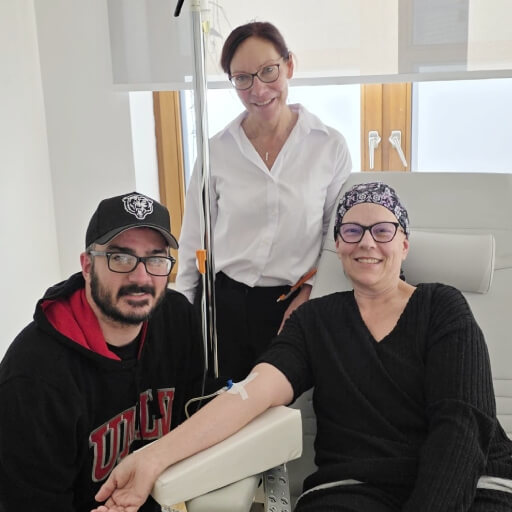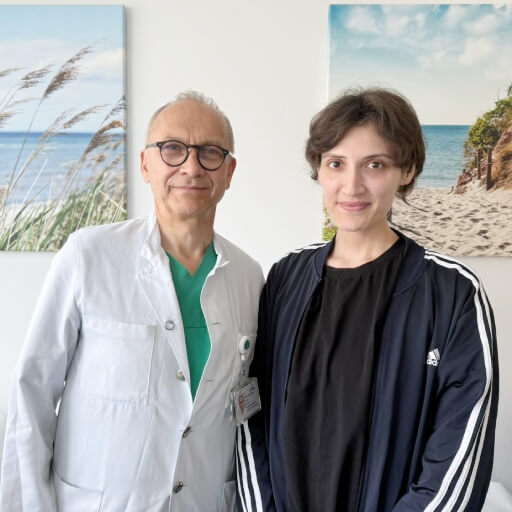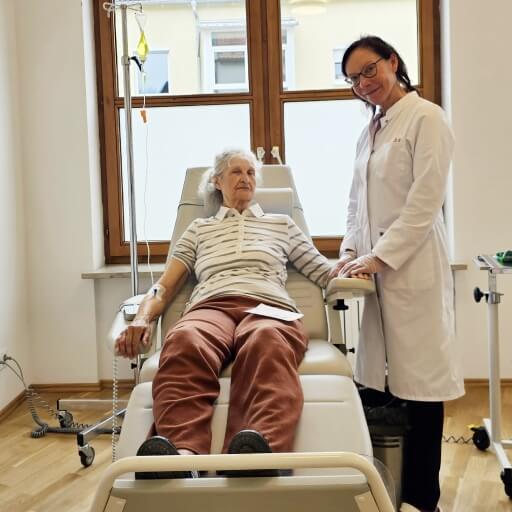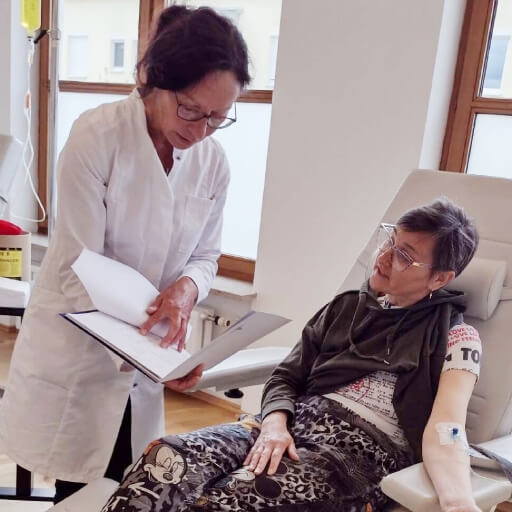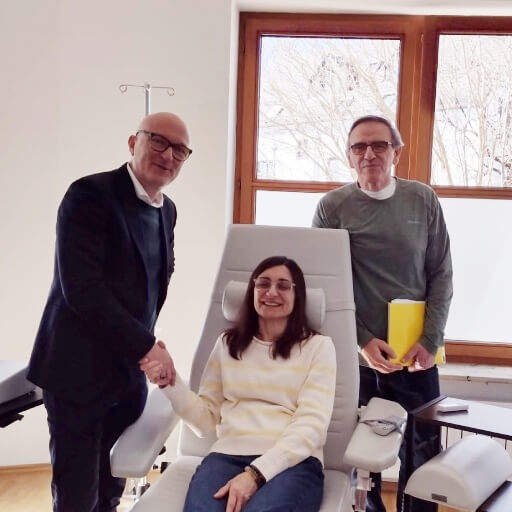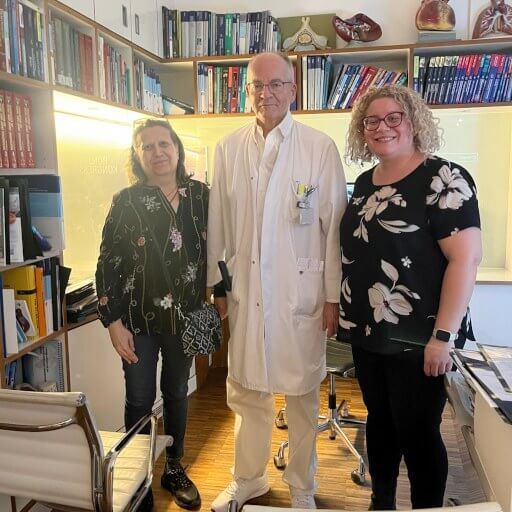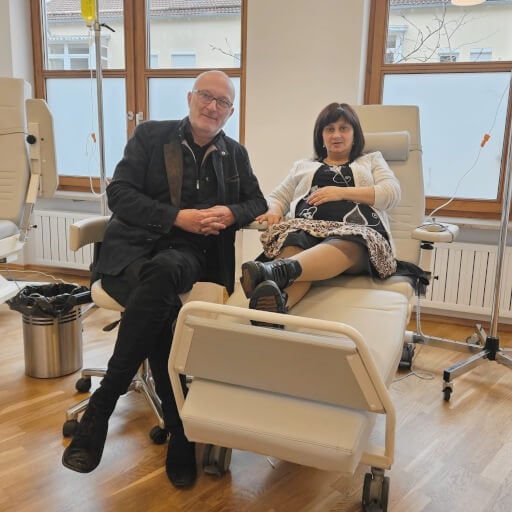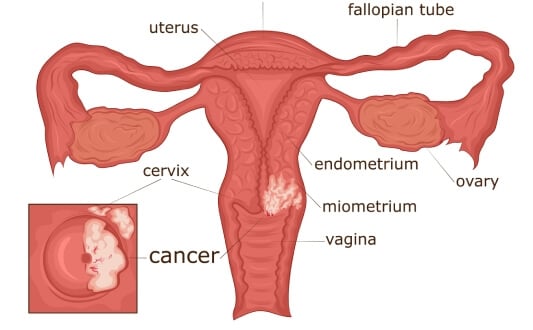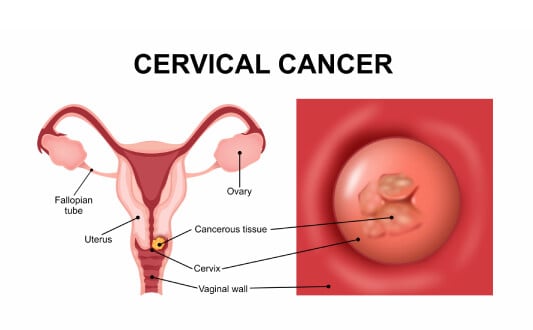يظل سرطان عنق الرحم Cervical cancer أحد أكثر الأورام النسائية الخبيثة شيوعاً حول العالم، مع تفاوت كبير في معدلات حدوث الإصابة والبقاء على قيد الحياة اعتماداً على الجغرافيا وإمكانية الوصول إلى الرعاية الطبية. وفقاً لمنظمة الصحة العالمية، يتم تشخيص أكثر من 600.000 امرأة بسرطان عنق الرحم كل عام على مستوى العالم، ويموت ما يُقرب من 340.000 امرأة بسبب هذا المرض، على الرغم من إمكانية الوقاية منه إلى حدٍ كبير من خلال التطعيم وفحص التحرّي المبكر [1].
تُقدم ألمانيا بعضاً من أكثر علاجات سرطان عنق الرحم تَقدُماً في أوروبا. من الجراحات طفيفة التوغل إلى العلاج الإشعاعي الدقيق والعلاجات الجهازية الموجهة، يستفيد المرضى من البروتوكولات القائمة على الأدلة والرعاية متعددة التخصصات في المستشفيات الجامعية الرائدة ومراكز السرطان.
لماذا تختارين ألمانيا لعلاج سرطان عنق الرحم
عند تشخيص سرطان عنق الرحم، يُصبح إيجاد المكان المناسب للرعاية الصحية أحد أهم القرارات التي تتخذها المريضة. تشتهر ألمانيا عالمياً بتميزها في علاج السرطان. تسافر المريضات من جميع أنحاء العالم لتلقي العلاج بأسعار معقولة في الخارج وعلاج سرطان عنق الرحم في ألمانيا المتقدم، من خلال الجمع بين من التكنولوجيا الطبية المتطورة، ومراكز الأورام المعتمدة، والرعاية الشخصية الحقيقية. لا يتعلق الأمر فقط بمعدلات البقاء على قيد الحياة المرتفعة - بل يتعلق أيضاً بالدعم الشامل الذي يركز على الإنسان في بعض من أكثر مرافق رعاية السرطان تقدُماً في أوروبا.
تكنولوجيا تدعم كل خطوة
في ألمانيا، يرتبط المستوى العالي لعلاج سرطان عنق الرحم بالتقنيات المتطورة المُستخدمة في التشخيص والعلاج. تقنيات التصوير بالرنين المغناطيسي عالي الدقة و PET/CT (لتحديد مرحلة المرض بدقة)، وصولاً إلى الجراحة الروبوتية Robotic surgery، وأساليب العلاج الإشعاعي الموجه بالصور - تستخدم المستشفيات الألمانية أدوات إلى جانب كونها أكثر دقة، فإن لها آثار جانبية أقل.
تُعد هذه التقنيات مُهمة بشكلٍ خاص في علاج سرطان عنق الرحم في مرحلة متقدمة، حيث يمكن للدقة أن تؤثر بشكلٍ مباشر على البقاء على قيد الحياة وجودة الحياة. في أفضل المراكز، التكنولوجيا عالية المستوى لا تُعتبراختيارية، بل ممارسة سريرية قياسية.
مستشفيات معتمدة ذات معايير عالية
تتم إدارة حالات سرطان عنق الرحم في ألمانيا في مؤسسات تُلبي أعلى المعايير الوطنية. عدد كبير من هذه المؤسسات معتمدة من قبل جمعية السرطان الألمانية، وهذا يعني أنها تلتزم ببروتوكولات العلاج الصارمة وتخضع لعمليات تدقيق منتظمة. تتم مناقشة كل حالة من قبل مجالس أورام متعددة التخصصات. وينتج عن ذلك مستويات ممتازة من التنسيق لرعاية السرطان في المستشفيات الألمانية، بهدف تحسين النتائج على المدى الطويل وتقليل المضاعفات.
ستكون Booking Health مفيدة أيضاً في تزويد المرضى الدوليين بمعلومات قيمة والتنقل في نظام العلاج لأنها ستساعد في اختيار أفضل المستشفيات، وإعداد الوثائق، وتخطيط جميع مراحل العلاج.

فرق متعددة التخصصات تعمل معاً على علاج سرطان عنق الرحم
يُعد النموذج متعدد التخصصات أحد أعظم نماذج رعاية السرطان في ألمانيا. يقوم فريق من أطباء الأورام النسائية، والمعالجين بالإشعاع، وأخصائيي الأشعة، وأخصائيي علم الأمراض، وعلماء النفس، وأخصائيي الخصوبة بعلاج كل مريضة. تضمن هذه الاستراتيجية التعاونية جميع جوانب المرض تؤخذ بعين الاعتبار، بما في ذلك بيولوجيا الورم والصحة العاطفية والإنجابية للمريضة. العلاج في ألمانيا واضح، ومُنظم، ويحظى بخبرة دولية، خاصةً عندما يكون سرطان عنق الرحم معقداً أو في مرحلة متقدمة.
علاج شخصي لسرطان عنق الرحم
تُحدد مراكز الأورام الألمانية عملية العلاج لديهم وفقاً لاحتياجات المرضى. قد يكون مرضاً في مراحله الأولية أو حالة أكثر تقدماً، لكن تحصل كل امرأة على خطة شخصية بالكامل. عندما يكون ذلك مناسباً من الناحية الطبية، يتم توفير الإجراءات المُحافظة على الخصوبة بالتزامن مع العلاجات الجراحية والطبية المنتظمة. المساعدة الإضافية - العلاج النفسي للأورام، والعلاج الطبيعي، والتغذية - يتم دمجهم مبكراً في بداية العملية لتوفير رعاية شاملة متكاملة.
في حالة المرضى الدوليين، تُعد Booking Health حلاً أيضاً للتغلب على الحواجز اللغوية واللوجستية، بالإضافة إلى تمكينهم من العثور على معلومات موثوقة بسرعة أكبر وتلقي الرعاية بدون تأخير. تساعد Booking Health المرضى في جميع المراحل، بدءاً من تنظيم الاستشارة الأولية وحتى المتابعة، لتزويدهم بعملية سلسة لشفاء السرطان في ألمانيا.
| نوع العلاج | معدل البقاء على قيد الحياة لمدة عامين | معدل الاستجابة | المدة | الآثار الجانبية |
|---|---|---|---|---|
| العلاجات القياسية | ~٪70-55 للمراحل المبكرة ~٪30 للمراحل المتقدمة | ~٪60-40 | من عدة أسابيع إلى أشهر | متوسطة إلى شديدة (تعب، وغثيان، وعقم، ومشاكل الأمعاء / المثانة) |
| الأساليب المبتكرة | ~٪75-60 في حالات متقدمة / مقاومة للعلاج مُختارة | ٪65-45 | من الممكن جلسات متعددة | خفيفة (حُمى، والتهاب موضعي، وأعراض تُشبه أعراض الأنفلونزا) |
*بناءً على البيانات السريرية لـ Booking Health والنتائج المنشورة. قد تختلف النتائج الفعلية اعتماداً على حالة المريض وبروتوكول العلاج.
الخيارات التشخيصية لسرطان عنق الرحم في المستشفيات الألمانية
يُعد الكشف المبكر عن المرض أمراً بالغ الأهمية في نجاح العلاج، خاصةً في حالة سرطان عنق الرحم الناجم عن فيروس الورم الحليمي البشري HPV. تتميّز المستشفيات الألمانية بنظام تشخيص مُنظّم وفعّال بشكلٍ جيد يسمح بتقليل فترات التأخير ويوفر العلاج اللازم للمرضى بأسرع وقتٍ ممكن.
طرق التشخيص القياسية في ألمانيا
في ألمانيا، يبدأ تشخيص سرطان عنق الرحم بفحص دوري يشمل مسحة عنق الرحم Pap smears والاختبار المشترك لفيروس الورم الحليمي البشري HPV co-testing. تتم إحالة المريضات على الفور لإجراء فحص آخر، في حال وجود نتائج غير طبيعية، على سبيل المثال تنظير المهبل، أو خزعة عنق الرحم، أو الاستئصال المخروطي. تُستخدم تقنيات التصوير الشعاعي مثل التصوير بالرنين المغناطيسي للحوض MRI و PET/CT بشكل متكرر لتحديد مرحلة المرض بدقة. يُمكّن هذا النهج المنهجي الأطباء من التخطيط لكل حالة بشكلٍ صحيح وبدء العلاج لسرطان عنق الرحم دون انتظار.
الثغرات في عملية فحص سرطان عنق الرحم
تُظهر الدراسات وجود هفوات نظامية في الولايات المتحدة الأمريكية، حيث يؤدي تفويت الفحوصات أو المتابعة إلى تسهيل تطوّر السرطان.
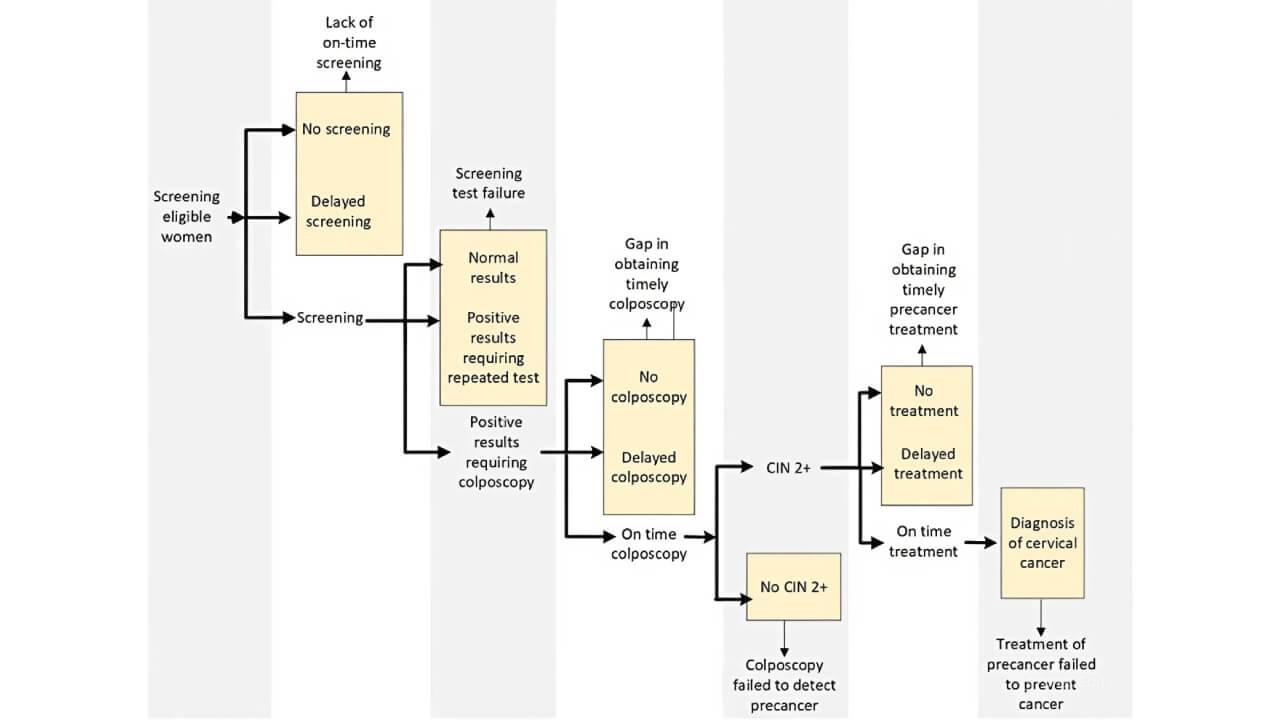
يُظهر الرسم التوضيحي المُصاحب لتلك المقالة بوضوح كيف يمكن للانقطاع في التشخيص أن يؤثر على الانتقال بين المراحل المبكرة والمتأخرة من تطور المرض.
استجابة ألمانيا القوية للثغرات التشخيصية
لقد تقدمت ألمانيا في تطوير نظامها بطريقة تمنع حدوث هذه الهفوات. تم تقديم البروتوكولات الموحدة، والمختبرات مضمونة الجودة، وإدارة البيانات الرقمية في برنامج الفحص المنظم للسرطان (oKFE) في عام 2020 [3]. تضمن هذه الاستراتيجية أن الاختبارات المشتركة، ومعالجة العينات، وتشخيصات المتابعة تُجرى بشكلٍ جيد.
أساليب علاج سرطان عنق الرحم الحديثة في ألمانيا
تجمع رعاية سرطان عنق الرحم في ألمانيا بين البروتوكولات السريرية ذات المعايير الذهبية وإمكانية الوصول إلى علاجات الأورام المتقدمة. يعتمد العلاج على مرحلة المرض، وعُمر المريضة، وأهداف الخصوبة، وعوامل صحية أخرى — لكن بغض النظر عن التفاصيل، تستفيد المريضات من نظام منهجي منظم قائم على الأدلة مع مساحة للابتكار. بالنسبة للكثيرين، فهذا يُمثل أيضاً فرصة للحصول على العلاج بأسعار معقولة في الخارج دون المساس بالجودة الطبية أو السلامة.
علاج سرطان عنق الرحم القياسي
عند تشخيص النساء بسرطان عنق الرحم في ألمانيا، يتم علاج معظمهن باستخدام تقنيات راسخة تم تطويرها على مدى عقود من الزمن. تُعد هذه الأساليب فعّالة للغاية، خاصةً عند تشخيص الحالة في مرحلة مبكرة.
الجراحة: استئصال الرحم وإزالة العقد اللمفاوية
استئصال الرحم (الإزالة الجراحية للرحم) يُعتبر أحد الركائز الأساسية لعلاج المرض الموضعي. يمكن للمريضات أيضاً الخضوع لاستئصال الرحم البسيط أو الجذري، الذي غالباً ما يتم إجراؤه مع إزالة العقد الليمفاوية الحوضية أو المحيطة بالأبهر لتحديد مدى الانتشار.
يمكن استخدام جراحة تنظير البطن Laparoscopic surgery أو الجراحة بمساعدة الروبوت Robotic-assisted surgery في كثير من الحالات كإجراء طفيف التوغل يساهم في التعافي بشكلٍ أسرع والحفاظ على الوظائف.
العلاج الإشعاعي
يظل الإشعاع أحد أفضل أساليب إدارة سرطان عنق الرحم. يُستخدم العلاج الإشعاعي الخارجي (EBRT) بشكلٍ متكرر جنباً إلى جنب مع تقنية المُعالجة الكثبية (العلاج الإشعاعي الداخلي)، حيث يتم إدخال مصادر مشعة مباشرةً داخل الورم أو حوله. هذا مزيج يمكن من خلاله توصيل جرعات عالية إلى الخلايا السرطانية مع الحفاظ على الأنسجة السليمة المحيطة. يتم تطبيقة عادةً بعد الجراحة أو كشكل رئيسي من العلاج في المراحل المتقدمة.
العلاج الكيميائي
عادةً ما يتم الجمع بين العلاج الإشعاعي والعلاج الكيميائي في شكل علاج كيميائي إشعاعي Chemoradiation. تُعتبر الأنظمة القائمة على البلاتين هي المعيار، وقد أظهر هذا المزيج مزايا في السيطرة الموضعية والبقاء على قيد الحياة، لا سيما في المراحل من الثانية إلى الرابعة من المرض. كما يمكن أن يكون العلاج الكيميائي الجهازي علاجاً تلطيفياً في الحالات المتكررة أو النقيلية.
علاجات سرطان عنق الرحم المبتكرة المتوفرة في ألمانيا
تُعد ألمانيا مركزاً للابتكار الطبي. تُستخدم هنا علاجات جديدة غير شائعة الاستخدام للمريضات اللاتي يعانين من سرطان عنق الرحم المتكرر، أو المتقدم، أو المقاوم للعلاج.
العلاج المناعي لسرطان عنق الرحم
يُعد العلاج المناعي لسرطان عنق الرحم حالياً جزءاً مُثبتاً من العلاج المبتكر لمرضى مُختارين. وقد أظهر العلاج المناعي باستخدام أدوية خاصة تُثَبِط نقاط التفتيش المناعية (PD-1) تأثيرات طويلة المدى في الأورام التي تُعبّر عن PD-L1 أو التي لديها عبء طفري عالي للورم.

في ألمانيا، يُعتبر العلاج المناعي لسرطان عنق الرحم جزءاً من العلاج المُخصص للمريضات اللاتي من المُرجح أن يشهدن تحسُناً، أو حتى كأداة لإطالة الحياة لدى المرضى الذين لم يعد بإمكانهم الاستجابة لأشكال العلاج الأخرى.
العلاج بالخلايا المتغصنة
تُعد ألمانيا إحدى الدول التي تُطبق العلاج بالخلايا المتغصنة Dendritic cell therapy لسرطان عنق الرحم بشكلٍ نشط. يتمثل تأثير هذا النهج في تدريب جهاز المناعة ليكون أكثر نجاحاً في تدمير الخلايا السرطانية. يتم إنتاج اللقاحات الفردية باستخدام مستضدات الورم الخاصة بالمريض. يُعد العلاج بالخلايا المتغصنة واعداً بشكلٍ خاص في علاج سرطانات عنق الرحم الناجمة عن فيروس الورم الحليمي البشري HPV، حيث يمكن للمناعة التعرف على مستضد واضح في البروتينات الفيروسية.
يُعرَف رالف ستاينمان بأنه صاحب اكتشاف الخلايا المتغصنة Dendritic cell وأهميتها في تنظيم المناعة، الإنجاز الذي نال عنه جائزة نوبل في علم وظائف الأعضاء أو الطب.
عادةً ما يتم الإبلاغ عن تحسُّن المناعة والقدرة على السيطرة على المرض لدى المرضى الذين عولِجوا بالخلايا المتغصنة.
TACE و HIPEC: استراتيجيات موجهة للنقائل
في بعض حالات سرطان عنق الرحم النقيلي، يتم استخدام علاجات موضعية مثل الانصمام الكيميائي عبر الشرايين (TACE) و HIPEC لمهاجمة الورم مباشرةً.
- الانصمام الكيميائي عبر الشرايين (TACE) هو علاج يقوم بتوصيل العلاج مباشرةً إلى الأوعية الدموية المرتبطة بالورم وإغلاق الأوعية الدموية عن طريق الانصمام. وهذا يسمح بإعطاء جرعات عالية من العلاج الكيميائي مع آثار جانبية أقل.
- HIPEC يُستخدم كجزء من التدخل الجراحي للتعامل مع نقائل الصفاق. يتم إدخال العلاج الكيميائي إلى تجويف البطن في شكله الساخن، مما يؤدي إلى تدمير الخلايا السرطانية التي لا يمكن تحديدها وإزالتها من خلال الجراحة. يجعل HIPEC الجراحة أكثر فعالية ويُحسن السيطرة الموضعية.
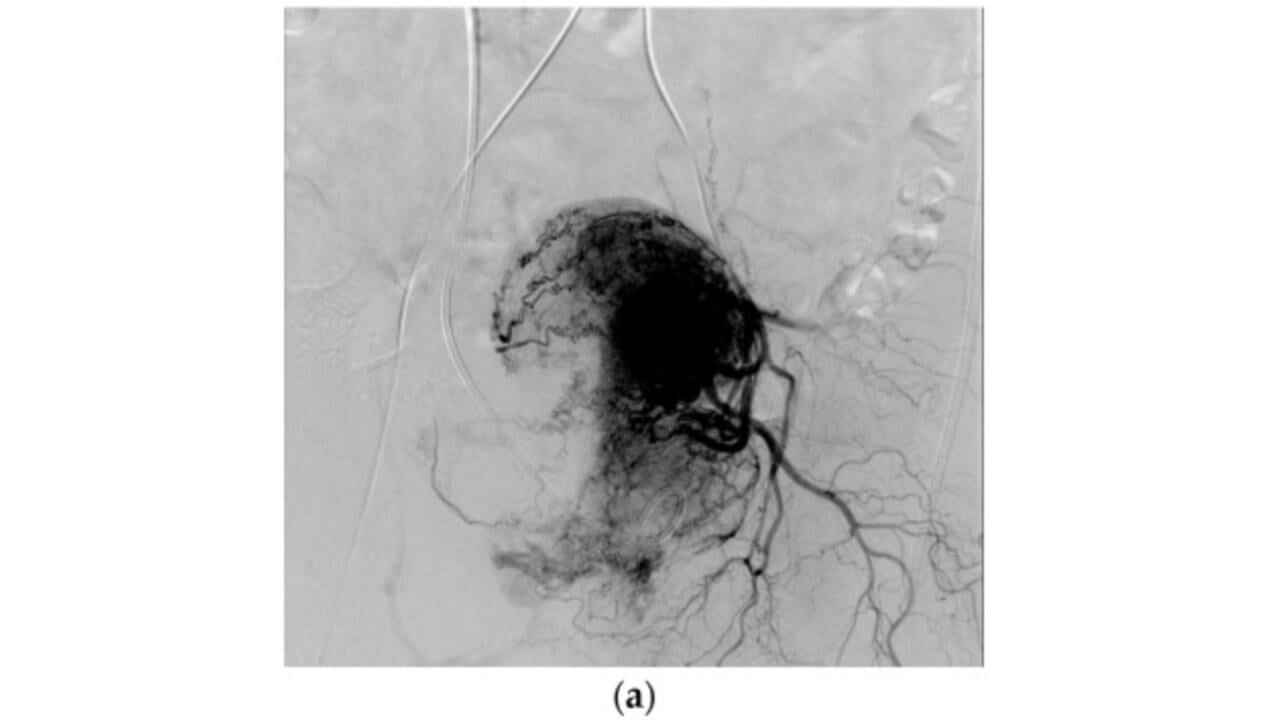
للحصول على رؤية أفضل وأكثر تركيزاً على الجانب السريري لإجراء TACE، بما في ذلك استهدافه الوعائي، وخطوات الانصمام (خطوات الانسداد)، ومُبررات العلاج، شاهد هذا العرض التقديمي التالي الرائع:
البروفيسور كوفاتش: لماذا ضاعفت تقنية TACE معدل البقاء على قيد الحياة لمرضى السرطان – ما يحتاج المرضى إلى معرفته
العلاج الكيميائي الكهربائي (ECT) لسرطان عنق الرحم
يمثل العلاج الكيميائي الكهربائي لسرطان عنق الرحم في ألمانيا نهجاً ثورياً. في مستشفى ميدياس بورغهاوزن، يقوم البروفيسور كارل ر. آيغنر — الرائد الذي نفذ أكثر من 20.000 إجراء تروية — بعلاج الأورام الخبيثة في الحوض باستخدام العلاج الكيميائي الكهربائي Electrochemotherapy بالاشتراك مع تقنيات التروية المعزولة التي تم تطويرها على مدار 45 عاماً.
الإجراء هو كما يلي: تقوم الأقطاب الكهربائية الموضوعة حول ورم عنق الرحم بإنشاء حقول كهربائية تفتح أغشية الخلايا السرطانية مؤقتاً. يزداد امتصاص دواء العلاج الكيميائي بشكلٍ كبير — حيث تتدفق الأدوية إلى خلايا الورم بمستويات يستحيل تحقيقها بطرق أخرى. يستند العلاج الكيميائي الكهربي لسرطان عنق الرحم على مبدأ مفاده: أن الخلايا السرطانية تُصبح أكثر عُرضةً للتأثُر بالنبضات الكهربائية مقارنةً بالخلايا السليمة.
تُقدم المراكز الألمانية العلاج الكيميائي الكهربائي Electrochemotherapy مع دعم شامل. يستفيد المرضى من أوقات انتظار أقصر — حيث يبدأ العلاج غالباً في غضون أسابيع من الاستشارة الأولية.
تعكس تكلفة العلاج الكيميائي الكهربائي الخبرة المطلوبة. توفر Booking Health تكلفة شفافة للعلاج الكيميائي الكهربائي Electrochemotherapy، وتساعد المرضى الدوليين على التنقل في نظام الرعاية الصحية الألماني.
العلاج الكيميائي الإقليمي لسرطان عنق الرحم
يوفر العلاج الكيميائي الإقليمي في ألمانيا علاجاً متقدماً من خلال مراكز متخصصة مثل مستشفى ميدياس بورغهاوزن، حيث يعالج البروفيسور كارل ر. آيغنر الأورام الخبيثة في الحوض باستخدام تقنيات التروية المعزولة. يُحقق العلاج الكيميائي الإقليمي لسرطان عنق الرحم نتائج يستحيل تحقيقها مع العلاج الكيميائي الجهازي القياسي: هدأة تامة دون الحاجة إلى العلاج الإشعاعي لدى مرضى مُختارين بعناية.
النهج الألماني: توصيل الدواء عبر الشرايين مع عزل تدفق الدم. تبقى أدوية العلاج الكيميائي في منطقة الحوض بتركيزات عالية بما يكفي لتدمير الأورام — ثم يتم ترشيحها قبل وصولها إلى الدورة الدموية الجهازية. وبذلك يتجنب المرضى الآثار الجانبية المدمرة للعلاج الكيميائي الجهازي (مثل الغثيان الشديد، وتساقط الشعر، وغيرها). لهذا السبب يسافر المرضى الدوليون إلى ألمانيا لتلقي العلاج الكيميائي الإقليمي Regional chemotherapy.
تمتد خبرة البروفيسور آيغنر لـ 45 عاماً وأَجرَى أكثر من 20.000 إجراء تروية — وهو رقم قياسي عالمي ولا يوجد أحد في العالم قد أجرى أكثر من ذلك. تستجيب سرطانات الخلايا الحرشفية مثل سرطان عنق الرحم جيداً بشكل خاص لأن إمداد الدم إلى هذه الأورام جيد. نُرحب بكم لمشاهدة المقابلة مع البروفيسور:
فرط الحرارة: تعزيز فعالية علاجات السرطان القياسية
أصبح العلاج بفرط الحرارة Hyperthermia أكثر شيوعاً في ألمانيا كإضافة فعالة للعلاج المتقدم لعلاج سرطان عنق الرحم. يعمل فرط الحرارة على تعزيز تدفق الدم وزيادة الحساسية للعلاج الكيميائي والإشعاع.
فرط الحرارة Hyperthermia يمكن أن يكون خياراً للسيطرة الموضعية على الورم في حالات المرض المقاوم للعلاج أو المتكرر. بدأت مستشفيات رعاية السرطان المتخصصة في تبنّي فكرة فرط الحرارة كجزء من استراتيجيات العلاج المُصممة خصيصاً لكل مريض، لا سيما في المرضى الذين تكون الخيارات العلاجية البديلة لديهم محدودة أو مستفذه.
تعكس هذه الأساليب الاتجاه الأوسع في طب الأورام الألماني - والمُتمثل في جعل الدقة شخصية وتوسيع حدود ما يمكن فعله وتحقيقه في العلاج المتقدم لسرطان عنق الرحم.
| تكلفة العلاج | الأساليب القياسية | الأساليب المبتكرة |
|---|---|---|
| سعر العلاج في ألمانيا | 25.000 $ – 280.000 $ للدورة الكاملة | 6.500 $ – 75.000 $ للدورة الكاملة |
| سعر العلاج في المملكة المتحدة | 26.000 $ – 320.000 $ للدورة الكاملة | 25.000 $ – 118.000 $ للدورة الكاملة |
| سعر العلاج في الولايات المتحدة الأمريكية | 100.000 $ – 350.000 $ للدورة الكاملة | 40.000 $ – 150.000 $ للدورة الكاملة |
رحلة طبية: كل خطوة على الطريق مع Booking Health
يُعد إيجاد أفضل استراتيجية علاج لحالتك السريرية مُهمةً صعبة. كونك مُرهقاً بالفعل من جلسات العلاج المتعددة، واستشارة العديد من المتخصصين، وتجربة تدخلات علاجية مختلفة، قد تشعر بالضياع وسط كم المعلومات التي يُقدّمها الأطباء. في مثل هذه الحالة، من السهل اختيار خيار مباشر أو اتباع بروتوكولات علاجية موحدة ذات قائمة طويلة من الآثار السلبية بدلاً من اختيار خيارات علاج مبتكرة عالية التخصص.
لاتخاذ قرار مُستنير والحصول على خطة شخصية لإدارة السرطان، والتي سيتم تصميمها لتُناسب حالتك السريرية المُحددة، استشر الخبراء الطبيين في Booking Health. نظراً لكونها في طليعة تقديم أحدث الابتكارات الطبية لمدة 12 عاماً بالفعل، تتمتع Booking Health بخبرة قوية في إنشاء برامج إدارة معقدة في كل حالة فردية. وبصفتها شركة مرموقة وموثوقة، تقدم Booking Health خطط علاج شخصية لسرطان عنق الرحم مع حجز مباشر للمستشفى ودعم كامل في كل مرحلة، بدءاً من العمليات التنظيمية وحتى المساعدة أثناء العلاج. نحن نقدم:
- تقييم وتحليل التقارير الطبية
- تطوير برنامج الرعاية الطبية
- اختيار موقع العلاج المناسب
- إعداد الوثائق الطبية وإرسالها إلى المستشفى المناسب
- الاستشارات التحضيرية مع الأطباء لتطوير أفضل برنامج علاج لسرطان عنق الرحم في ألمانيا
- نصائح الخبراء أثناء الإقامة في المستشفى
- رعاية المتابعة بعد عودة المريض إلى بلده الأصلي بعد إكمال برنامج الرعاية الطبية
- الاهتمام بالإجراءات الرسمية كجزء من التحضير لبرنامج الرعاية الطبية
- تنسيق وتنظيم إقامة المريض في بلد أجنبي
- المساعدة في الحصول على التأشيرات وتذاكر الطيران
- مُنسق شخصي ومترجم فوري مع دعم على مدار الساعة 24/7
- ميزانية شفافة بدون تكاليف خفية
الصحة جانب لا يُقدر بثمن في حياتنا. ينبغي تفويض إدارة شيء هش للغاية ولكنه ثمين فقط إلى خبراء يتمتعون بخبرة مُثبتة وسمعة طيبة. تُعد Booking Health شريك جدير بالثقة يساعدك في الحصول على صحة أقوى وجودة حياة أفضل. اتصلي بمستشارنا الطبي لمعرفة المزيد عن إمكانيات العلاج الشخصي باستخدام طرق مبتكرة لسرطان عنق الرحم مع أفضل المتخصصين الرائدين في هذا المجال.
علاج السرطان في الخارج: تجارب المرضى مع Booking Health
الأسئلة الشائعة لمرضانا حول علاج سرطان عنق الرحم في ألمانيا
أرسل طلب للعلاجيتم علاج سرطان عنق الرحم في ألمانيا باستخدام الجراحة، والعلاج الإشعاعي الخارجي، والمعالجة الكثبية (العلاج الإشعاعي الخارجي)، والعلاج الكيميائي، ومؤخراً، العلاج المناعي، و TACE و HIPEC والعلاجات القائمة على الخلايا المتغصنة Dendritic cell. يُستخدم كل منها حسب مرحلة ونوع سرطان عنق الرحم.
يعتمد سعر الجراحة لسرطان عنق الرحم في ألمانيا على مدى تعقيد الحالة والمستشفى، لكن بشكلٍ عام يتراوح بين 25.000 يورو و 45.000 يورو. تُساعد Booking Health في توضيح جميع التكاليف المتوقعة مُسبقاً.
نعم، تُقدم Booking Health دعماً كاملاً للسفر لـ العلاج في ألمانيا، بما في ذلك المساعدة في الحصول على التأشيرة، والانتقالات من وإلى المطار، والإقامة، وخدمات المترجم الفوري. يضمن فريق BH أن يشعر المرضى الدوليين بالثقة والدعم منذ الخطوة الأولى.
نعم، في المستشفيات الألمانية الرائدة، يكون العلاج المناعي لسرطان عنق الرحم على مستوى عالٍ. عادةً ما يتم تطبيقه في الحالات التقدُمية أو المتكررة، خاصةً في الأورام التي تُعبر عن PD-L1. في الحالات التي يكون فيها ذلك مناسباً من الناحية السريرية، يتم دمج العلاج المناعي في برنامج علاج فردي.
بالتأكيد. الجراحة طفيفة التوغل، مثل استئصال الرحم بالتنظير البطني Laparoscopic أو استئصال الرحم الروبوتي Robotic وإزالة العقد الليمفاوية، تُمارَس في العديد من المستشفيات في ألمانيا. تُساعد هذه الأساليب في تقليل وقت التعافي، والتَندُب، والمضاعفات التي تحدث بعد الجراحة، مع الحفاظ على سلامة المرضى في علاج الأورام.
نعم، يتم إجراء العلاج بالخلايا المتغصنة في ألمانيا. يعمل هذا العلاج المناعي على تحفيز الجهاز المناعي للمريض لمهاجمة الخلايا السرطانية، خاصةً عندما تكون حالة سرطان عنق الرحم المرتبط بفيروس الورم الحليمي البشري HPV.
يتم علاج سرطان عنق الرحم المرتبط بفيروس الورم الحليمي البشري بالجراحة والعلاج الإشعاعي، بالإضافة إلى العلاج الكيميائي والعلاجات المناعية مثل العلاج بالخلايا المتغصنة Dendritic cell therapy. ينصب تركيز المستشفيات الألمانية على التشخيص المبكر لسرطان عنق الرحم.
نعم، هناك الكثير من المستشفيات المعتمدة في ألمانيا حيث تسمح الأجهزة والمعدات بعلاج سرطان عنق الرحم. تتميز هذه المراكز بمستوى عالٍ من حيث الجودة وتتبع مبادئ توجيهية قائمة على الأدلة.
بالتأكيد. يمكن للرأي الثاني بشأن سرطان عنق الرحم تأكيد التشخيص، والتحقق من المرحلة، واقتراح نظام علاج جديد من قبل طبيب أورام ألماني. Booking Health هي خدمة تُساعد المرضى في الحصول على رأي ثانٍ من طبيب أورام ألماني.
تضمن Booking Health حصول كل امرأة على خطة علاج لسرطان عنق الرحم في ألمانيا بشكل فردي دون إهدار كل من الوقت والجهد. من خلال اختيار المستشفى الأنسب، وتنظيم السفر، والترجمات، والأعمال الورقية الطبية، يجعل فريق عمل BH الرحلة العلاجية مُريحة ومُحاطة بالرعاية.
نعم، تُقدم ألمانيا علاج متقدم لسرطان عنق الرحم النقيلي باستخدام العلاج المناعي Immunotherapy و TACE و HIPEC والتطعيم بالخلايا المتغصنة Dendritic cell immunizations. تُستخدم هذه العلاجات في الحالات التي لم تعد فيها العلاجات التقليدية فعّالة.
تشمل الأعراض التي قد تُبلغ عنها النساء ألم الحوض المستمر، والنزيف المهبلي غير الطبيعي، والاضطرابات البولية، وفقدان الشهية، وما إلى ذلك. تُعد الفحوصات السنوية مهمة للكشف المبكر عن السرطان – إذ لا توجد مظاهر مَرضية مُحددة للمرض.
تتراوح تكلفة العلاج القياسي في ألمانيا 80.000 € - 150.000 €، بينما تتراوح تكلفة الأساليب المبتكرة 25.000 € - 60.000 €. للمقارنة، في المملكة المتحدة، تتراوح التكلفة 90.000 € - 165.000 € للعلاج القياسي و 70.000 € - 120.000 € للأساليب المبتكرة؛ وفي الولايات المتحدة الأمريكية – تتراوح التكلفة 100.000 € - 180.000 € للعلاج القياسي و 100.000 € - 150.000 € للأساليب المبتكرة.
يختلف هذا المعدل بنحو 25-30٪ بالنسبة للعلاج القياسي (في الحالات المتقدمة). والأهم من ذلك، أن الأساليب الجديدة المُستخدمة في ألمانيا ترفع المؤشر بنسبة 60-65٪.
يفشل العلاج القياسي في تحقيق استجابة تزيد عن 10٪ في سرطان عنق الرحم المتقدم ذات التوقعات السيئة. أما الأساليب المبتكرة التي تُطبّق في المستشفيات الحديثة في ألمانيا تُحقق استجابة بنسبة 45-65٪.
يستغرق العلاج القياسي عدة أشهر – يتم إجراؤه في دورات متعددة. أما الأساليب المبتكرة فيمكن استكمالها في بضع جلسات، أو حتى بحقنة واحدة (إذا كنا نتحدث عن التطعيم بالخلايا المتغصنة Dendritic cell vaccination).
اختر العلاج في الخارج وستحصل بالتأكيد على أفضل النتائج!
المؤلفون:
تم تحرير المقال من قبل خبراء طبيين وأطباء معتمدين من مجلس الأطباء الدكتورة ناديجدا إيفانيسوفا و الدكتور بوغدان ميخالنيوك. لعلاج الحالات المشار إليها في المقال، يجب استشارة الطبيب؛ المعلومات الواردة في المقالة ليست مخصصة للتطبيب الذاتي!
سياستنا التحريرية، التي توضح بالتفصيل التزامنا بالدقة والشفافية، متاحة هنا. انقر على هذا الرابط لمراجعة سياساتنا.
المصادر:
[1] WHO. Cervical cancer.
https://www.who.int/news-room/fact-sheets/detail/cervical-cancer
[2] PubMed. Gaps in the screening process for women diagnosed with cervical cancer in four diverse US health care settings.
https://pubmed.ncbi.nlm.nih.gov/36106421/
[3] PubMed. Implementation of the Program for Early Detection of Cervical Cancer in the Federal Republic of Germany.
https://pubmed.ncbi.nlm.nih.gov/32410894/
[4] PubMed. Immune checkpoint inhibitors in cervical cancer: Current status and research progress.
https://pubmed.ncbi.nlm.nih.gov/36387196/
[5] PubMed. Therapy Response and Survival among Patients with Gynecologic Tumors Treated with Transarterial Chemoperfusion and Transarterial Chemoembolization.
https://pubmed.ncbi.nlm.nih.gov/39459373/
اقرأ:
قائمة المقالات:
لا تعرف من أين تبدأ؟
اتصل بـ Booking Health
